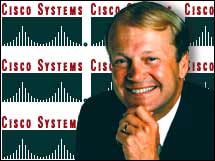|
The big engine that can't
Cisco investors are hoping Tuesday's earnings report will show it's back on track.
NEW YORK (FORTUNE) - For too long now, Cisco Systems has been the big engine that can't. Its legions of fans, including the sad sacks who've held onto Cisco's stock for longer than they'd care to admit, are hoping an upbeat earnings report Tuesday evening will signal that the once-mighty locomotive is back on track. Since the stock-market bubble burst in 2000, the whole technology world has suffered as its beloved flag bearer has floundered. Scandal-free, sure. Oozing cash, of course. Praised near and far for its management strength and leadership on good-citizenship issues like education, why yes.
Yet Cisco (Research) has suffered -- interminably, it seems -- from a nasty case of bigcompanyitis. The condition has hit Dell (Research), Oracle (Research) and Intel (Research) as well. The chief symptom of this frightful malady: persistently slow growth. Congenitally upbeat CEO John Chambers has promised Cisco will return to annual earnings-per-share growth in the 10 percent to 15 percent range. That's a far cry from the days when a Cisco quarter was a failure at less than 50 percent growth. But hitting that range would be a welcome relief from recent growth rates in the high single digits. It'd make Cisco a growth stock again. More to the point, double-digit growth would get Cisco's stock moving once more. Almost a year ago, Fortune asked "What's Wrong With Cisco?" (Click here to read the story.) Investors priced the stock then at about $18 a share. Today: a hair less than $18 a share. Hot that's not. How likely is it that Cisco will blow the doors off? Not very. Cisco itself has promised only moderate progress, aiming to land squarely, predictably and even boringly within its modern-maturity earnings growth range. Should Cisco deliver about what its closest observers expect � second fiscal quarter EPS of 25 cents; revenue of around $6.6 billion � don't expect a whole hell of a lot to happen. Investors repeatedly have refused to applaud business as usual at Cisco. Influential UBS analyst Nikos Theodosopoulos, who rates Cisco's shares an unenthusiastic "neutral," recently raised his price target on Cisco's shares from $19.50 to $21. He noted that Cisco has slightly loosened its restraints on hiring non-sales employees, surely a sign that Cisco at least is bullish on its prospects. Investor reaction: Show me the results. There are other reasons for optimism at Cisco. Internet phone calling (often shorthanded VOIP, or voice over Internet protocol) and Internet video applications finally are becoming a reality. eBay's purchase of Net calling startup Skype and Apple's new video service are two examples. (Does anyone know, however, what is taking Vonage, another VOIP company, so long to complete its long-rumored IPO?) Cisco has spent the better part of the young century positioning itself to sell VOIP and video-over-broadband equipment. Also, Cisco's soon-to-close acquisition of Scientific-Atlanta, a leader in cable set-top boxes and presumably the owner of big ideas in the video-phone-Internet markets, should bolster Cisco's position there. Finally, even the hint that Cisco has put its slow-growth phase behind it would excite investors. Steve Kamman, an analyst with CIBC World Markets, worked himself into a cheerleading lather in a recent (and bullish) report by arguing that the "fast-thinning ranks of negatively nattering nabobs that have dogged [Cisco's] stock during 2005" are beginning to quiet down. Kamman - whose colorful turn of phrase mangles Spiro Agnew's famous put-down of the Nixon-hating press corps -- doesn't offer any evidence that the ranks of Cisco's detractors have thinned. But he has a point -- backed up by a "sector outperformer" rating and $25 price target.
All it took for the chronically underperforming shares of Hewlett Packard (Research) to zoom was for the computer maker to turn in several consistent quarters. Cisco just might jump again on the hint, for the first time in years, that its best days are front of it. |
| |||||||||||||||||||||||||||||||||||||||||||||

